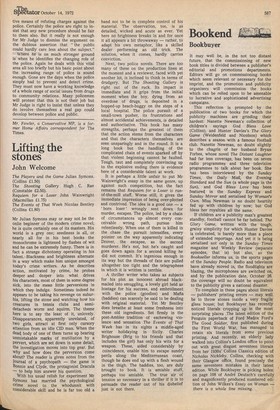Lifting the stones
John Welcome
The Players and the Game Julian Symons. (Collins £1.50) The Shooting Gallery Hugh C. Rae (Constable £2.50).
Requiem for a Loser John Wainwright (Macmillan £1.75) The Events of That Week Nicolas Bentley (Collins £1.80) Mr Julian Symons may or may not be the onlie beginner of the modern crime novel; he is quite certainly one of its masters. His world is a grey one; seediness is all, or nearly all for in his best books the monochrome is lightened by flashes of wit and he can be extremely funny. There is in fact a strange dichotomy operating in his talent. Blackness and brightness alternate in a way which make him unique amongst today's crime writers. As he describes action, motivated by crime, he probes deeper and deeper into what drives his characters, most of them in some degree sick, into the mean little perversions in which they indulge. Sometimes indeed he appears to be taking his revenge on suburbia, lifting the stone and watching how his creatures in tennis clubs and semidetacheds worm and squirm. The theme here is to say the least of it, unlovely. Disappearances, apparently unrelated, of two girls, attract at first only cursory attention from an idle CID man. When the dead body of one of them turns up bearing unmistakable marks of mutiliation by a Pervert, which are set down in some detail, the investigation moves into top gear. But Why and how does the perversion come about? The reader is given notes from the Journal of a psychopath — the game is Bonnie and Clyde, the protagonist Dracula to help him answer his question.
With his usual relish for experiment Mr Symons has married the psychological crime novel to the whodunnit with considerable skill and he is far too old a hand not to be in complete control of his material. The observation, too, is as detailed, wicked and acute as ever. Yet here no brightness breaks in and for once it all appears a bit throwaway — rather, to adapt his own metaphor, like a skilled dealer performing an old trick. The solution, when it comes, hardly carries conviction.
Next, two police novels. There are too many of these on the production lines at the moment and a reviewer, faced with yet another lot, is inclined to think in terms of drudgery. But The Shooting Gallery is right out of the ruck. Its impact is immediate and it grips from the initial moment when the boy, dying from an overdose of drugs, is deposited in a hopped-up beach-buggy on the steps of a local hospital. The police pursuit of a small-town pusher, its frustrations and almost accidental achievements, is detailed and authoritative. This book has many strengths, perhaps the greatest of them that the action stems from the characters and that the characters themselves are seen unsparingly and in the round. It is a long book but the handling of the complicated chain of events sparked off by that violent beginning cannot be faulted. Tough, taut and completely convincing up to the explosive ending there is evidence here of a considerable talent at work.
It is perhaps a little unfair to put Mr Wainwright's essay in the same genre, up against such competition, but the fact remains that Requiem for a Loser is runof-the-mill stuff. Worse still, it gives the immediate impression of being over-plotted and contrived. The idea is a good one — a born loser' wrongly sent down for murder, escapes. The police, led by a chain of circumstances up almost every conceivable wrong path, pursue him relentlessly. When one of them is killed in the chase the pursuit intensifies, every pointer on the way apparently indicating Drover, the escapee, as the second murderer. He's not, but he's caught and goes down again for a second killing he did not commit. It's ingenious enough in its way but the threads of fate are pulled altogether too tight and the telegraphese in which it is written is terrible.
A thriller writer who takes as subjects for his plot an innocent abroad blackmailed into smuggling, a lovely girl held as hostage for his success, and embroilment with the police (goodies) and Mafia (baddies) can scarcely be said to be dealing with original material. Yet Mr Bentley does breathe at least some freshness into these old ingredients. Set firmly in the post-Ambler tradition of eschewing violence and sensation The Events of That Week has in its sights a middle-aged writer holidaying in Sicily. Charles Brighouse (Brig to his friends and that includes the girl) has only his wits for a weapon. These, aided considerably by coincidence, enable him to escape sundry perils along the Mediterranean coast, though he does end up with a flesh wound in the thigh. The baddies, too, are duly brought to book. It is amiable stuff, perhaps too amiable. The true air of tension so necessary in a thriller if it is to persuade the reader out of his disbelief just is not there.














































 Previous page
Previous page